Enhancing Owner Satisfaction: A Guide for Short-Term Rental Property Managers
Discover practical tips for Short-Term Rental property managers to enhance owner satisfaction, improve performance, and strengthen relationships. From clear communication to revenue maximization, prioritize owner satisfaction for long-term success.
July 21, 2023
Michelle
.png)
In the world of Short-Term Rentals, the satisfaction of professional property managers and owners is paramount to the success of your business. Happy owners are more likely to provide repeat business and refer your property management services to others. As a Short-Term property manager, it's crucial to prioritize owner satisfaction. Here are some practical tips on enhancing owner satisfaction and strengthening your business relationships.

1. Foster Regular and Transparent Communication
Open and regular communication is vital for improving owner satisfaction. Keep property owners updated on property status, bookings, and revenue. For example, sharing monthly reports with detailed financial breakdowns and occupancy rates can give owners valuable insights into their property management team's performance. Promptly share any issues or concerns and maintain transparency throughout. Real-life examples of effective communication can make the content more relatable and engaging for readers.
Transparent communication between property managers and owners is crucial for building trust, maintaining a strong partnership, and achieving mutual success.
Here are some strategies to promote transparent communication:
Establish Clear Channels of Communication:

Set up regular communication channels such as emails, phone calls, and scheduled meetings to discuss property updates, performance reports, and concerns.
Use property management software or platforms that facilitate seamless communication and information sharing.
Utilize communication tools like email, messaging apps, and property management software to maintain an organized and efficient flow of information.
During onboarding, clearly outline how communication will be conducted, including the frequency of updates, preferred methods, and response times.
Provide Regular Updates:
Regularly share performance reports, occupancy rates, and financial statements with owners. This demonstrates transparency and keeps owners informed about their property's status.
Become a Proactive Short-Term Property Manager:
Don't wait for owners to reach out with questions or concerns. Initiate communication to update them on any changes, maintenance issues, or improvements.
If owners have questions or concerns, address them promptly and thoroughly. Delayed or vague responses can lead to mistrust
Be honest about the successes and challenges your property management company faces. Transparently sharing any issues allows for joint problem-solving.
Use Visual Aids:

Utilize photos, videos, and visual presentations of your property listing status and results to provide clear updates about the property's condition, maintenance work, and improvements.
Provide Detailed Financial Reports:
Clearly break down financial reports, showing rental income, expenses, fees, and any deductions. This level of transparency builds trust and showcases the property's financial health.
Hold Regular Meetings and Involve Owners in Decision-Making:
Many property managers and owners have different management styles. Some owners delegate decision-making to the property management company and just require a periodic report, while others are hands-on with the entire rental process. Either way, property managers should be able to address these different types of management.
Schedule regular check-in meetings with owners, either in person or virtually, to discuss property performance, upcoming plans, and any changes in marketing strategy.
When making significant decisions about the property, involve owners in the process. Seek their input and consider their preferences. This collaborative approach shows that you value their input.
When explaining decisions related to dynamic pricing, marketing strategies, property descriptions, or property improvements, provide context and data to justify your choices.
If mistakes or issues arise, acknowledge them, take responsibility, and propose solutions to rectify them. Transparency extends to admitting when things don't go as planned.
Document Agreements in Writing:
Whenever you make agreements or decisions, document them in writing. This provides a clear record of discussions and prevents misunderstandings.
If possible, send minutes of the meeting. This would serve as a reliable source of information that can be referred to later. With this, everyone is assured that they are on the same page.
Minutes can serve as evidence of discussions and agreements, which can be crucial in disputes or legal matters. They provide a documented record of the parties' intentions. They can be shared among stakeholders, allowing them to provide input or corrections. This encourages collaboration and collective decision-making.
Remember that transparent communication is an ongoing effort. You can build a strong working relationship with the property owner that benefits both parties by consistently demonstrating your commitment to open and honest communication.
2. Set Clear Expectations

Clear expectations lay the foundation for a successful partnership. Define rental rates, occupancy rates, maintenance and cleaning schedules, and other important details upfront. Additionally, discuss Key Performance Indicators (KPIs) that can be tracked to measure owner satisfaction, such as average rating scores or past guests feedback. By establishing clear expectations and KPIs, you can prevent misunderstandings and assess your performance to make data-driven improvements.
Here are some common KPIs for property management
Occupancy Rate:
The percentage of time a property is rented out. It helps gauge how effectively properties are being utilized and how well they are marketed.
Average Daily Rate (ADR):
The average price per night for a rented property. A rising ADR indicates the potential for increased revenue.
Revenue per Available Room (RevPAR):
Total revenue generated is divided by the total number of available rooms. It reflects both occupancy and pricing performance.
Gross Operating Income (GOI):
Total revenue from the property minus the cost of goods sold and operational expenses.
Net Operating Income (NOI):
GOI minus all operating expenses except for debt service and income taxes. It shows the whole property portfolio's profitability.
Rent Collection Rate:
The percentage of rent collected compared to the total rent owed. This helps evaluate the effectiveness of rent collection procedures.
Maintenance and Repairs Cost:
The total cost of property maintenance and repairs. Monitoring this helps control expenses and ensure the property's condition.
Tenant Turnover Rate (Long-Term Rentals):
The frequency at which tenants move out. High turnover rates can be costly due to vacancy periods and preparation costs for new tenants.
Average Length of Stay:
The average duration tenants stay in a property. It can influence marketing strategies and tenant satisfaction initiatives.
Tenant/Guest Satisfaction Score:
Gather tenant/guest feedback to assess their satisfaction with the property and management services.
Operating Expense Ratio:
Operating expenses are divided by effective gross income (GOI minus vacancy losses). It shows the proportion of rental income being used for property operations.
Capitalization Rate (Cap Rate):
NOI is divided by the property's market value. It helps assess the potential return on investment.
Return on Investment (ROI):
The profitability of an investment is calculated as the net profit divided by the initial investment.
Debt Service Coverage Ratio (DSCR):
Net operating income divided by total debt service. It assesses a property's ability to cover its debt obligations.
Lease Expiration and Renewal Rate:
Monitor lease expiration dates and the rate at which tenants renew their leases. It can impact occupancy stability.
Maintenance Response Time:
Measure how quickly maintenance requests are addressed. Fast response times contribute to tenant/guest satisfaction.
Marketing Conversion Rate:
The percentage of inquiries or leads that result in signed leases or STR reservations. It helps assess the effectiveness of marketing efforts.
Operating Cost per Unit:
Total operating expenses are divided by the number of units. It provides a per-unit view of operating costs.
Energy Efficiency and Sustainability Metrics:

Measure energy consumption, water usage, and waste management practices to ensure sustainable operations.
Guest Satisfaction and Reviews:

Monitor guest reviews and satisfaction scores for short-term vacation rentals to improve guest experiences.
3. Focus on Revenue Maximization

As a Short-Term Vacation Rental property manager, your primary objective is to maximize revenue for the property owner. Revenue maximization is critical to property management, directly impacting a property owner or vacation rental business's financial success and sustainability.
Here are some strategies to help you reach revenue maximization :
Optimize Pricing Strategies:

Implement dynamic pricing based on market demand, seasonality, and local events. Offer tiered pricing options or special packages to attract different market segments.
Market Research and Analysis:
Stay updated about local real estate trends, economic conditions, and competitor pricing to make informed pricing decisions.
Effective Marketing:
Invest in professional property photos, write property descriptions yourself and ensure they are descriptive, and provide virtual tours to showcase the property's best features. List the property on multiple online platforms to reach a wider audience.
Minimize Vacancy Periods:

Aim for high occupancy rates through effective marketing and competitive pricing. Offer incentives for longer leases or advance bookings to reduce gaps in occupancy.
Enhance Guest or Tenant Experience:
Focus on delivering excellent customer service to encourage repeat business and positive reviews. Provide well-maintained properties and be responsive through communication channels.
Implement Revenue Management Systems:
Utilize property management software with revenue features; many top property management companies use systematic pricing strategy based on data-driven insights. With analytics and data, you can refer to historical data to identify booking patterns, peak seasons, and areas for revenue growth.
Offer Value-Added Services:

Provide services that justify higher pricing, such as activities, property maintenance, or additional amenities.
Cross-Selling and Upselling:
Offer optional add-ons or upgrades that can increase the overall revenue per transaction. You may also consider adding revenue-generating amenities such as vending machines, laundry facilities, or paid parking.
Flexible Rental Terms:
Offer options for shorter-term, mid-term, or long-term rent scenarios to cater to different customer preferences. Provide discounts or incentives for tenants or guests who pay in advance.
Focus on Renewals and Retention:
Maintain positive relationships with current tenants or guests to encourage lease renewals or return visits.
Minimize Operating Costs:
Efficiently manage expenses by negotiating contracts, sourcing cost-effective suppliers, and reducing waste.
4. Property Management Companies Maintenance and Upkeep

Maintaining the property's condition is pivotal to improving owner satisfaction.
Conduct regular inspections, address maintenance issues promptly, and ensure the property is clean and well-maintained. These efforts demonstrate your commitment to the property and foster trust with the owner.
Here is a general overview of what may be needed for your property maintenance:
Physical maintenance

Allocate a budget for routine maintenance tasks such as:
- HVAC system servicing, plumbing checks, electrical inspections, and pest control.
- Painting and Repairs. Plan for periodic repainting and repairs to walls, ceilings, doors, and windows to keep the property looking fresh and well-maintained.
- Flooring and Carpeting. Invest in durable flooring materials that can withstand wear and tear. Regularly clean and replace carpets as needed.
- Roof and Gutters. Ensure the roof is in good condition to prevent leaks and structural damage. Clean gutters regularly to avoid water damage.
- Exterior Maintenance. Budget for landscaping, lawn care, and exterior cleaning. Keep walkways, driveways, and outdoor spaces well-maintained.
- Ensure windows are sealed properly to prevent drafts and energy loss. Consider investing in better insulation to improve energy efficiency.
Appliances and Equipment

- Repair or replace appliances, HVAC systems, water heaters, and other equipment to ensure tenant comfort and safety as needed. Install and maintain smoke detectors, carbon monoxide detectors, fire extinguishers, and security systems to ensure tenant safety.
- Keep plumbing and electrical systems up to code and address any issues promptly to avoid costly repairs.
Upgrades and Renovations:
Plan for periodic upgrades to keep the property competitive and attractive to guests or tenants. This could include kitchen and bathroom updates, new fixtures, or energy-efficient improvements.
Trash and Recycling Management:
Provide appropriate waste disposal solutions for tenants and ensure that trash collection is well-organized.
Tenant/Guest Turnover Costs:
Budget for expenses associated with tenant/guest turnover, such as cleaning, painting, repairs, and/or advertising.
Property Management Fees:
If you're using a property management company, account for their fees in your maintenance budget.
Emergency Fund:
Set aside funds for unexpected repairs or emergencies that may arise, such as storm damage or sudden equipment breakdowns. Purchasing insurance for your property with coverage for the specific type of stay is also highly recommended.
Legal and Regulatory Compliance:
Budget for any necessary legal fees or permits. Ensure that you are stay informed of the existing short-term vacation rental industry laws.
5. Provide Exceptional Customer Service
Exceptional customer service is the key to owner satisfaction. Respond promptly to inquiries and issues, resolve problems effectively, and go the extra mile to meet owners' needs. Highlight technology or software solutions that streamline communication, bookings, and reporting for vacation rental property managers and property owners. This showcases your commitment to efficiency and enhances the owner’s experience. Case studies or testimonials from satisfied property owners can add credibility and illustrate the effectiveness of your customer service approach.
6. Leverage Technology, like Clearing, to Enable Owner Collaboration
Embracing technology is essential for fostering owner collaboration and satisfaction. By utilizing advanced financial management platforms like Clearing, you can revolutionize your vacation rental property management business and provide property owners with a seamless and collaborative experience. Clearing offers a user-friendly interface for owners to access financial data and property performance metrics. Through Clearing's dedicated portal, owners can stay informed and engaged with the financial health of their vacation rental properties.

Enhancing owner satisfaction is crucial for the long-term success of your property rental management business. By fostering regular and transparent communication, setting clear expectations and performance metrics, focusing on revenue maximization, investing in property maintenance and upkeep, and providing exceptional customer service with the help of technology, you can establish strong and lasting relationships with property owners.
Remember, satisfied owners are more likely to provide repeat business and referrals, making owner satisfaction a top priority for the sustainability and prosperity of your property rental management company and/or vacation rental business.
To learn more about managing owner financials in Clearing, book a demo today!
Clearing is a Financial Technology Company, not a bank.

.png)
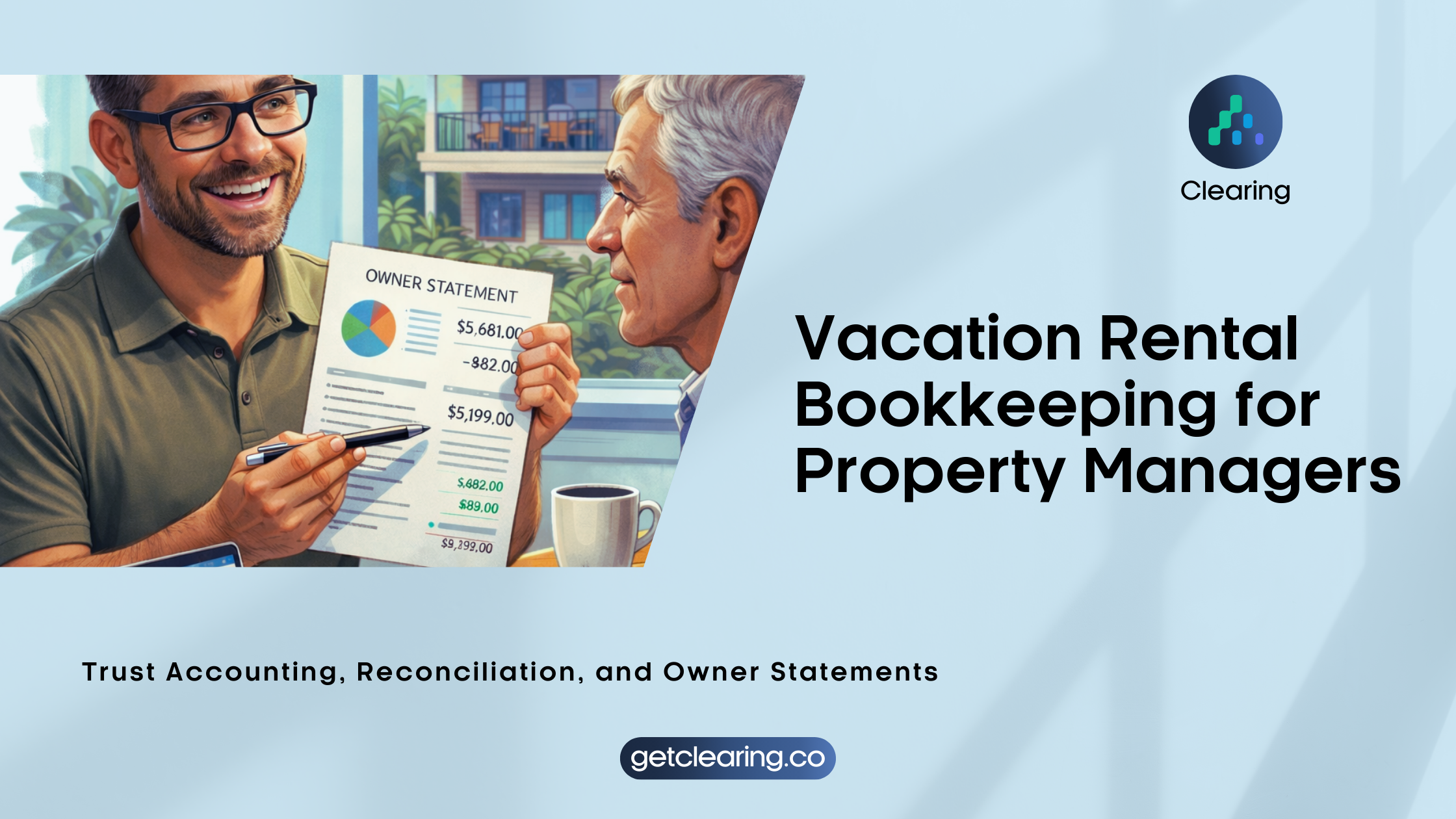
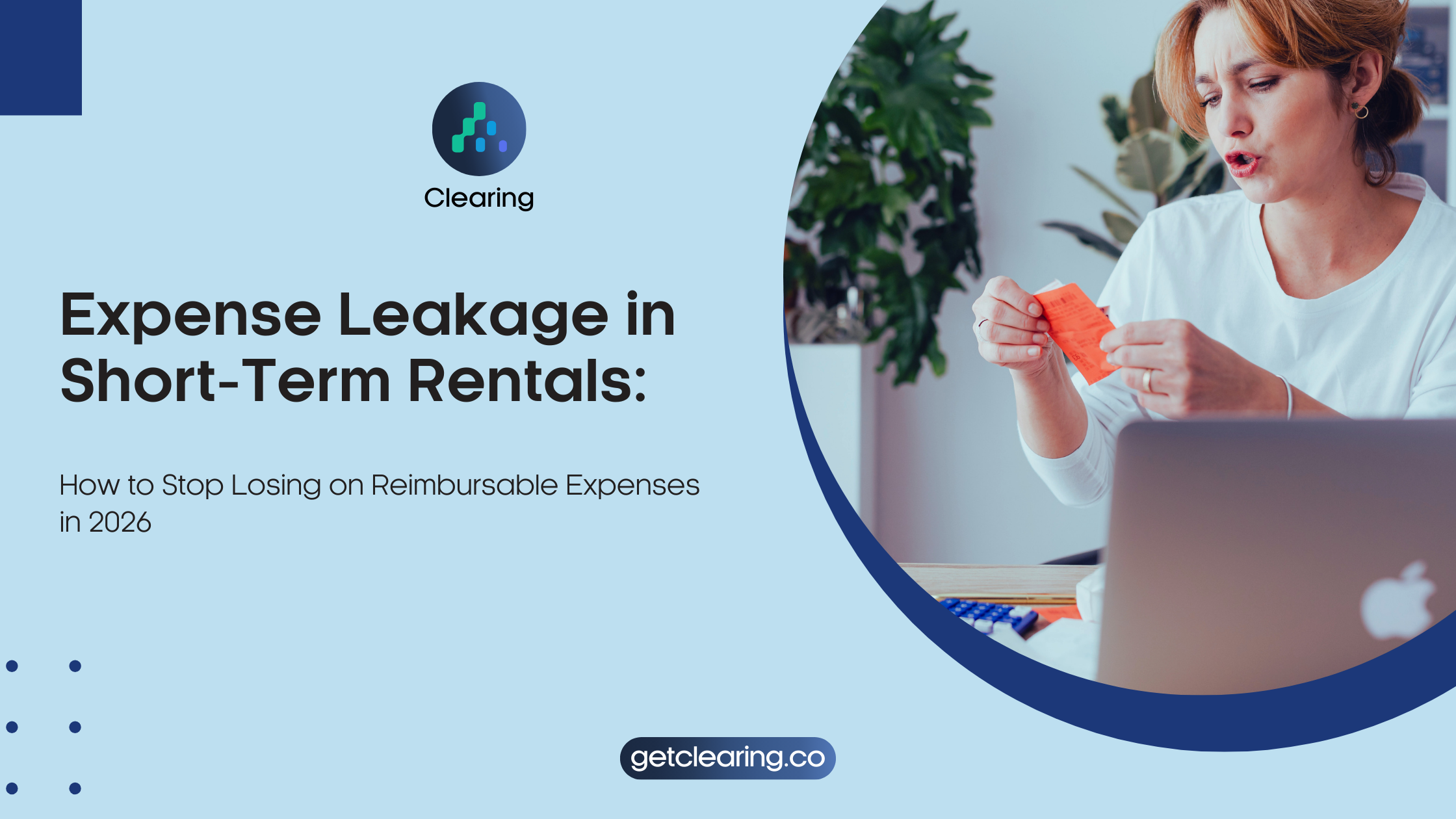


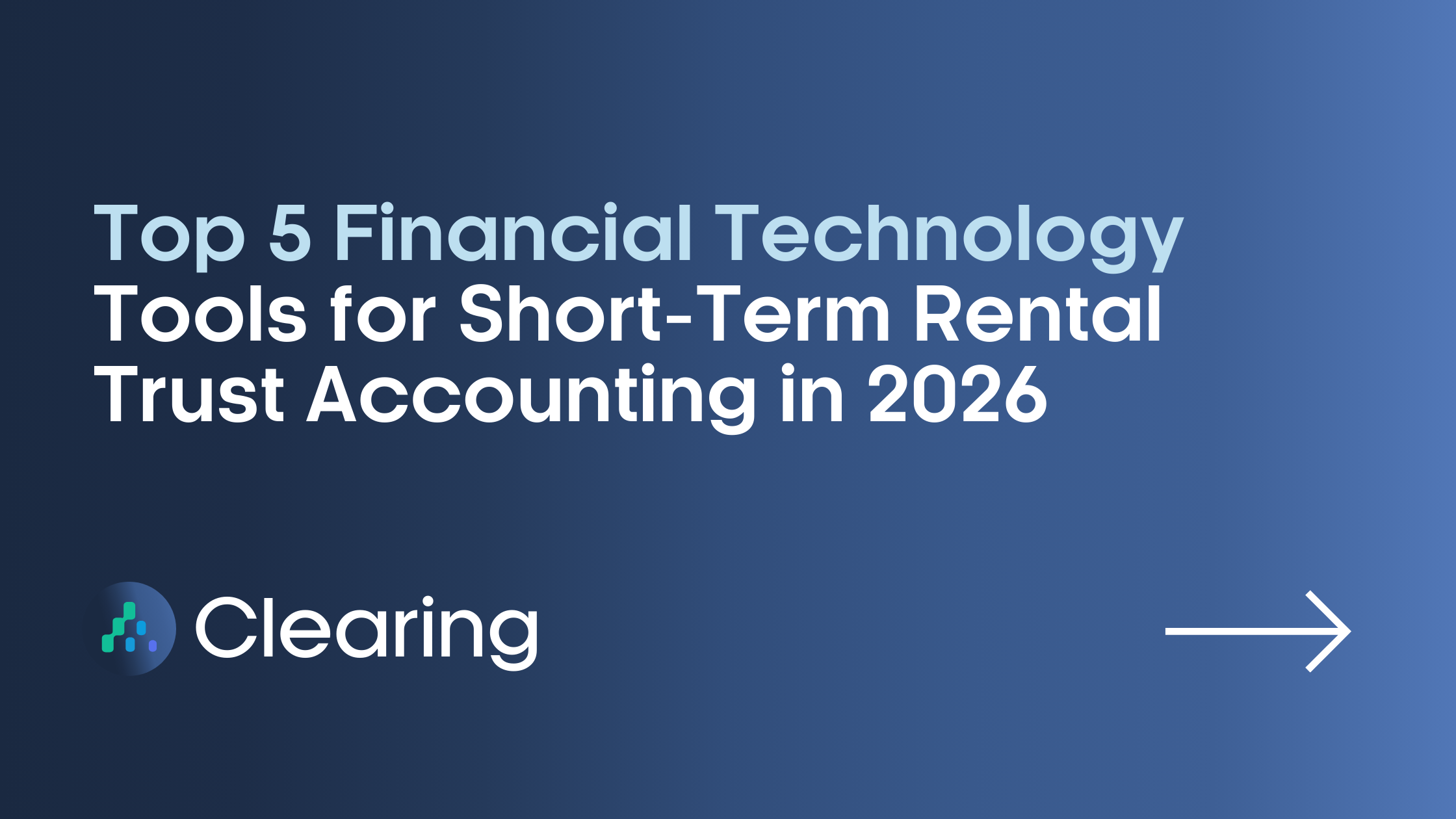
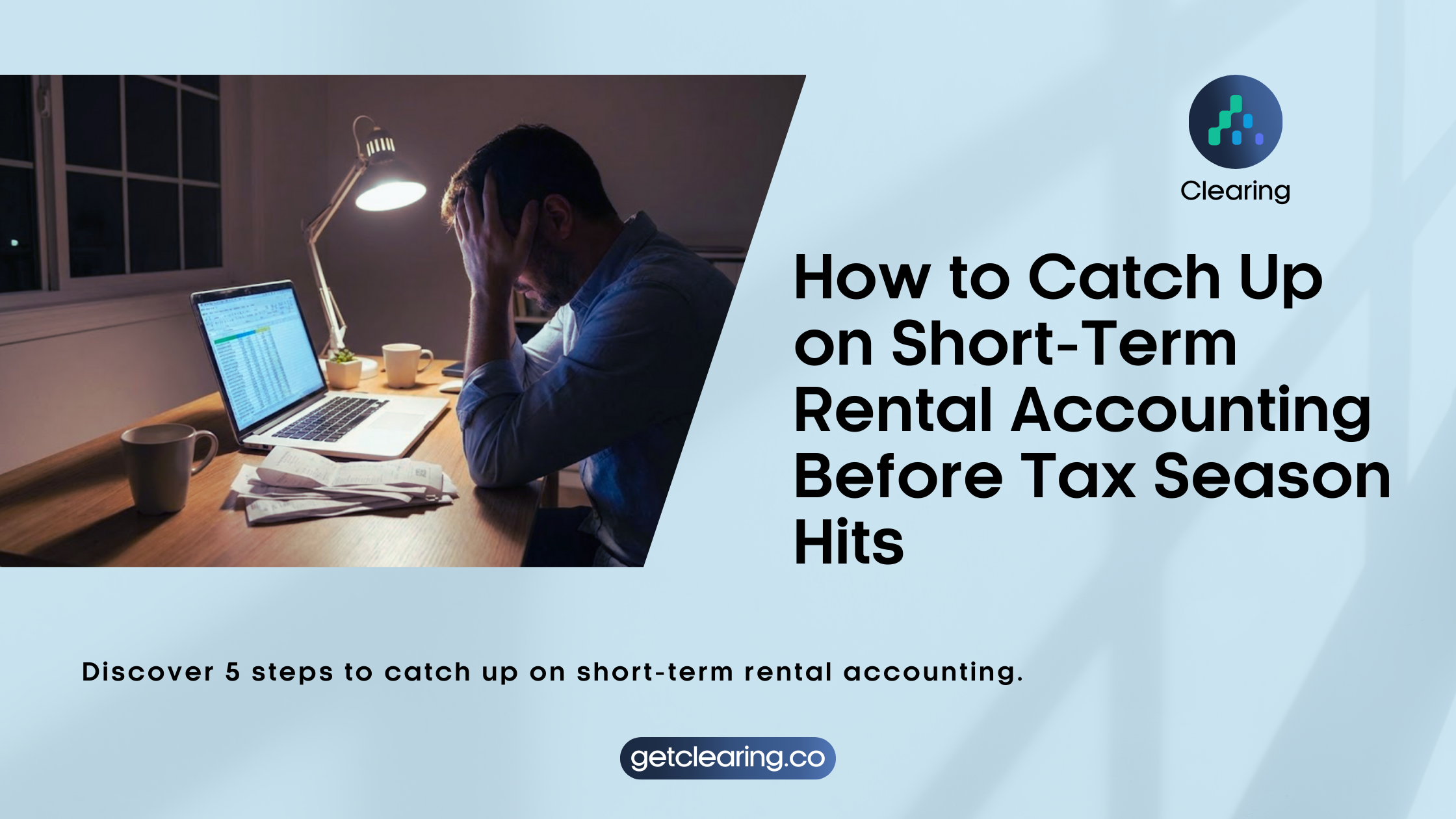
.png)
.png)
.png)
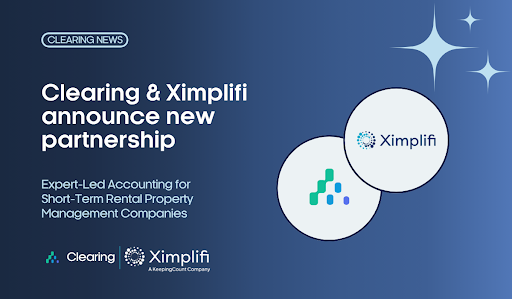
.png)
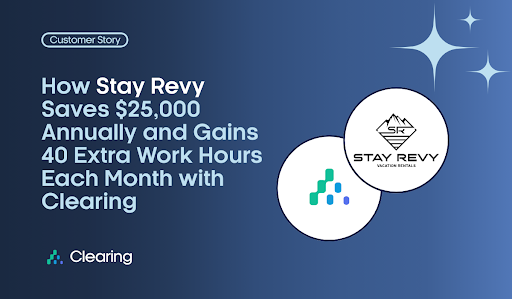
.png)
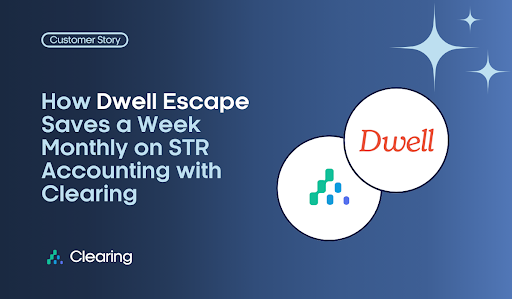

.png)
.png)
.png)
%20(1).png)
%20(1).png)
%20(1).png)
.png)
%20(2).png)
%20(1).png)
%20(1).png)
.png)

.png)
.png)
.png)
%20(1).png)
.png)
.png)
.png)
.png)
.png)
.png)
.png)
%20(1).png)
.png)
.png)
.png)
%20(1).png)
%20(1).png)
%20(1).png)








.jpg)
%20(1).png)
%20(1).png)
%20(2).png)
%20(1).png)

%20(1).png)
%20(1).png)
%20(1).png)



%20(1).png)
%20(1).png)
%20(1).png)
%20(1).png)
%20(1).png)


%20(1).png)
%20(1).png)
%20(1).png)
%20(2).png)
%20(2).png)



%20(2).png)


%20(2).png)
%20(1).png)
.png)


%20(2).png)
%20(2).png)

.jpg)
.png)
.png)
.png)



.png)